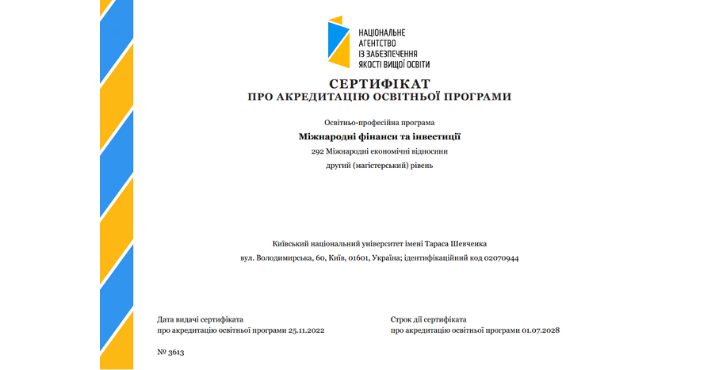Education Program "International Finance and Investments"

Master's educational program
«INTERNATIONAL FINANCE AND INVESTMENTS»
Level of higher education: Second (Master's) level of higher education;
Degree of higher education: Master's degree;
Field of knowledge: C Social Sciences, Journalism, Information and International Relations,
D Business, Administration and Law;
Speciality: C1 Economics and International Economic Relations (by specialization),
D2 Finance, Banking, Insurance and Stock Market;
Selective specialized blocks: (1) International investment practice; (2) International financial activities.
Language of teaching and assessment: Ukrainian;
The scope of the educational program: 90 ECTS credits, 1.5 years;
Type of program: educational and professional;
Form of education: full-time.
The purpose of the program:
Training professionals in international economic relations in international finance and investments, who can solve complex modern tasks and problems of practical nature, conduct research and carry out innovations under uncertain conditions and requirements.
Educational program "INTERNATIONAL FINANCE AND INVESTMENTS" (International Economic Relations)
The educational components of the «International Finance and Investments» program are:
MANDATORY COMPONENTS:
1. International Financial Management.
2. International Monetary Economics.
3. International Enterprise and Direct Investments.
4. Scientific and Empirical Study of International Economic Relations.
5. International Business Insurance.
6. International Banking.
7. Diplomatic Protocol and Business Etiquette.
8. Foreign Language.
9. International Portfolio Investing.
10. International Financial Markets.
11. Theories of International Finance.
12. International Lending.
13. Pre-diploma Practice.
14. Master’s Thesis Writing.
OPTIONAL COMPONENTS:
Selective specialized block «International Investment Practice»:
1. Strategic Management of Multinational Enterprise.
2. Ethics in International Investing.
3. Business Plan of Multinational Enterprise.
4. International Investment Management.
5. International Investment Projects: Case Studies.
6. International Startup Financing.
Selective specialized block «International Financial Activities»:
1. Current Problems in International Finance.
2. International Financial Engineering.
3. Tax Management of Multinational Enterprise.
4. Global Derivatives Market.
5. International Financial Analytics.
6. Strategies for Optimizing International Investment Portfolios.
We would be grateful for recommendations, suggestions and wishes regarding the educational program.
Please send your offers:
to the e-mail address of the Department of International Finance: kmf_348@ukr.net
to the e-mail address of the guarantor of the program Pavlo Dziuba: pavlo_dzyuba@ukr.net
by phone of the Department of International Finance: +380 (44) 481 44 89